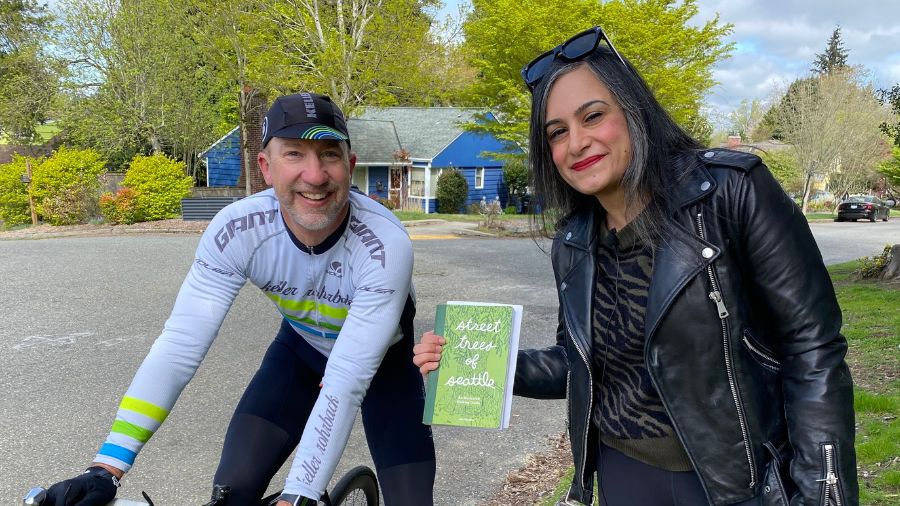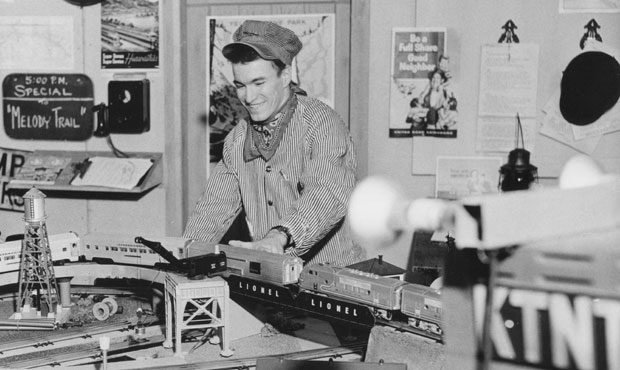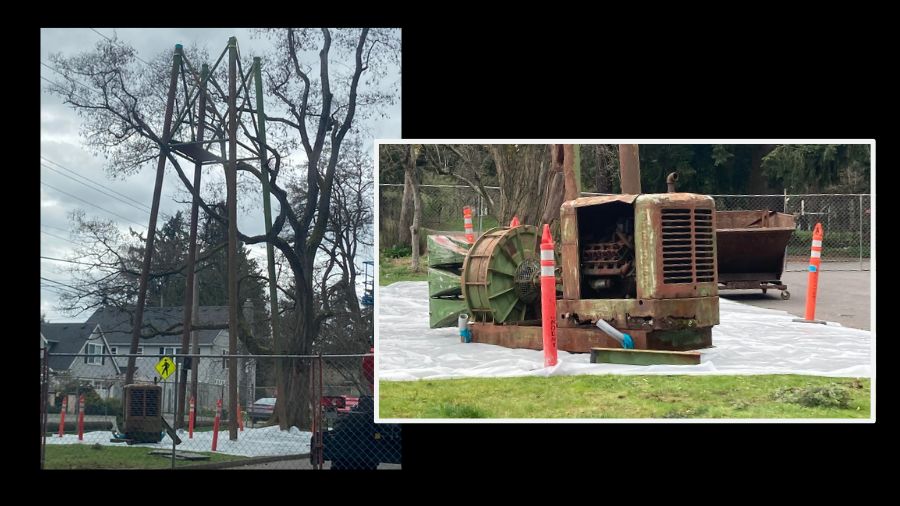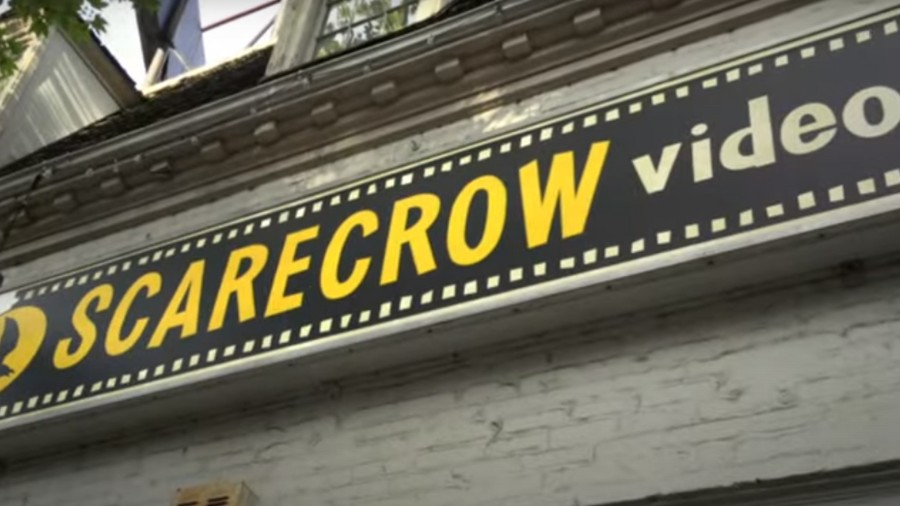174-year-old geoducks and other mysteries of Puget Sound history
Apr 21, 2021, 9:16 AM | Updated: 9:24 am

Author David B. Williams' at Richmond Beach in Shoreline; his new book is called "Homewaters: A Human and Natural History of Puget Sound." (Feliks Banel/KIRO Radio)
(Feliks Banel/KIRO Radio)
It’s been a transportation system and a source of food, and it’s a body of water that underpins thousands of years of history and culture in this area. And now, Puget Sound is the focus of an ambitious new history book.
The book from is from UW Press and is called Homewaters: A Human and Natural History of Puget Sound. The author is David B. Williams, who also wrote the popular history of Seattle’s regrades called Too High and Too Steep, which was published a few years ago.
What’s now called Puget Sound – known as “Whulge” in the Indigenous Lushootseed language – was created by glaciers about 15,000 years ago. That’s a lot of history, and a lot of ground (or water) to cover, which Williams deftly approaches from several directions via multiple scientific and cultural disciplines. The result is a highly readable and enjoyable account that connects seemingly disparate threads and weaves together a complex mix of science and humanities that’s greater than the sum of its parts – much like Puget Sound history itself.
Along a rocky stretch in Shoreline a few days ago, David Williams sat on a beached log and shared highlights from years of research for the book – traveling all over Puget Sound, exploring places like kelp beds, meeting with a diverse range of experts, and learning about incredible species like rockfish, orca, … and at least one ancient geoduck.
“At Richmond Beach, somewhere around here, 10 or 15 years ago,” Williams explained, “Washington state biologists pulled up a geoduck clam that was 174 years old, which means it was here just after or just before the Wilkes Expedition in 1841.”
That a likely unaware geoduck only recently deceased – yes, those scientists had to kill the poor geoduck to determine its age – was around here nearly two centuries ago when Charles Wilkes led a Naval expedition to survey and attach names to geographic features in and around Puget Sound is nothing short of amazing.
And the history of the name “Puget Sound” goes back just slightly further, when that geoduck’s ancestors likely didn’t notice the arrival of Captain George Vancouver, when he led a British expedition that amounted to the first European exploration of this area in May 1792.
As part of that voyage – which combined acts of scientific exploration and political possession – Captain Vancouver sent Lieutenant Peter Puget to explore the waterway’s southern reaches.
“Peter comes back to the boat, and Vancouver writes in his journal, ‘To honor his exertions, I named this part of this area Puget’s Sound,’” Williams said. “And it really was just the south end of the sound, basically south of Seattle or maybe even south of Tacoma – what becomes those areas – and Admiralty Inlet was the [name for the] whole body of water to the north.”
Initially, Williams says, the name “Puget’s Sound” only applied to a much smaller area than it does now.
That possessive “s” eventually disappeared, and, Williams says “everything has reversed over time [and the name] Puget Sound has just grown and expanded to take in the entire body of water, and Admiralty Inlet is now the mouth between Port Townsend and Whidbey Island.”
Along with expansions of the boundaries of the area that it denotes – and becoming the dominant name for the water as well as for the region – what’s also unusual about Puget Sound is how late, comparatively speaking, that Europeans came here, a full 300 years after Columbus reached North America. And even though Indigenous history stretches back thousands of years before that, European settlement rapidly – and radically – changed the culture, the economics, the environment and, well, pretty much everything around here.
“This … is really the last European-explored body of salt water in the Lower 48 states, which is really amazing, and yet it also has this incredibly long history,” Williams said. “We’ve got evidence going back 13,000, 14,000 years of people here.”
Williams is not Indigenous, but he clearly has done thoughtful research and pored over the written records and connected with tribes whose members have inhabited what’s now Puget Sound for millennia, and Homewaters reflects the big picture, long-range history – which radically shifts with the arrival of Europeans.
“When [non-Indigenous] people come here and start to exploit the landscape, they immediately have markets to go to,” Williams said. “We had San Francisco, this incredibly huge market that just was insatiable, so we could ship coal, we could ship wood, … salmon, herring, Olympia oysters, everything, and so that commercial development could almost happen immediately.”
That commercial development – along with disease, and the treaties in the 1850s that forced Indigenous people onto reservations – meant rapid change, and decades of environmental degradation that Puget Sound is gradually starting to recover from – which is a surprising takeaway from this book, and an unexpectedly hopeful message.
Puget Sound is alive, Williams says, with a living history, and there are great ways to connect with that history beyond merely reading a book. One of Williams’ favorites is by hiking up Mount Townsend in Olympic National Forest.
“It’s the best view,” Williams said. “I’ve hiked up there with my wife, and you can see all the way down the Sound. I’m pretty sure you can see all the way down to Satsop, to the nuclear towers down there. You can see north way up into Canada. You can see the Olympics, you can see the Cascades. You can really get a feel for both the incredible size of this place, but also the intimacy of all the little real bays and inlets and islands here.”
“I just still think it’s the best view I’ve ever seen at that end of the Sound,” Williams said.
Another great way to experience Puget Sound, of course, is to ride a ferry. In preparing his book, Williams made it his goal to ride every single route in the area. He took all the familiar cross-sound trips, and he rode the smaller county ferries, too. And there was one more category of Puget Sound passenger vessel that he previously knew nothing about.
“They’re the private ferries, … these homeowners associations that have ferries to their islands,” Williams said, before describing the full range of receptivity to his research efforts that he experienced as a curious ferry passenger.
“All I was trying to do is explain that I’m trying to ride all the ferries,” Williams said. “[But] the one to Decatur Island, they wouldn’t even let me on the boat. The one to Hat or [what’s also called] Gedney Island, they let me on the boat, but they wouldn’t let me off the boat on their island.”
Finally, Williams says, he found one private ferry operation that understood his mission and fully indulged him.
“At Herron Island, down in the South Sound, they let me on the boat, and they let me off the boat [on Herron Island], and they let me back on the boat again,” Williams said, chuckling. “I just want to clarify that part.”
David Williams’ commitment to the research should be obvious. Along with those challenging attempts to ride private ferries, he also made time to spend the day at a geoduck nursery.
“I got to see little baby geoducks,” Williams said. “Oh my God, they are the cutest thing, because the big ones – we all know what the big ones look like. They’re not terribly, … well, they are terribly phallic looking, but when they’re little, they got a shell that’s maybe the size of a pinto bean, and they’ve got that little neck that sticks out, and the little neck goes wiggle, wiggle, wiggle.”
“They are really cute,” Williams said.
Williams’ sincere and self-deprecating nature and lively writing style keep Homewaters from becoming a scientific tome; the human history and natural history are, of course, inextricably linked, and this book has the balance just right.
Back on the beach in Shoreline, Williams looks west as the waves crash, the wind blows, and the voices of the gulls and the people mix and only occasionally rise above the ambient cacophony – part of the onomatopoeic origins of the name “Whulge” – that’s business as usual along Puget Sound.
“It’s just stunning to me – the diversity and the complexity of the ecosystem here, combined with both the fragility and the resiliency,” Williams said. “And we have both those here.”
And while challenges remain – for nature and for the people – Williams is optimistic.
“If we give Puget Sound a chance, it can slowly become healthier over time,” he said. “But it’s going to really take all us to do it.”
“We look out and think, ‘Oh, it’s just blue water,’” Williams said. “And it’s so much, much more.”
Homewaters is out now from UW Press and is available from most booksellers and libraries. David B. Williams will be giving a series of free author presentations over the coming months, including an online conversation with Mary Ann Gwinn on Monday, May 3, through Seattle Public Library.
You can hear Feliks every Wednesday and Friday morning on Seattle’s Morning News, read more from him here, and subscribe to The Resident Historian Podcast here. If you have a story idea, please email Feliks here.













